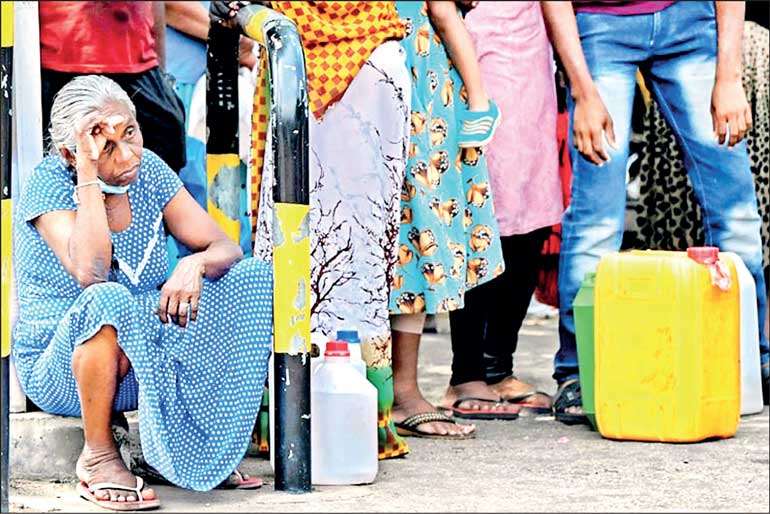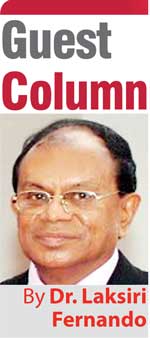Friday Feb 20, 2026
Friday Feb 20, 2026
Wednesday, 27 September 2023 00:00 - - {{hitsCtrl.values.hits}}

Without an NEP, governance accountability to the people and to the international community cannot be fulfilled
 For the second time, Ranil Wickremesinghe has inaugurated a National Evaluation Policy (NEP) for Sri Lanka. The first one was in 2018 and also in September at the Global Parliamentarians Forum for Evaluation (GPFE) held in Colombo. As its website said, “The National Evaluation Policy (NEP) of Sri Lanka, was launched by Prime Minister Ranil Wickremesinghe at ‘EvalColombo 2018,’ the first ever global conference on evaluation organised by the Global Parliamentarians Forum for Evaluation (GPFE).”
For the second time, Ranil Wickremesinghe has inaugurated a National Evaluation Policy (NEP) for Sri Lanka. The first one was in 2018 and also in September at the Global Parliamentarians Forum for Evaluation (GPFE) held in Colombo. As its website said, “The National Evaluation Policy (NEP) of Sri Lanka, was launched by Prime Minister Ranil Wickremesinghe at ‘EvalColombo 2018,’ the first ever global conference on evaluation organised by the Global Parliamentarians Forum for Evaluation (GPFE).”
Blocked website?
Now this second time he has inaugurated the same or a different one as the President of Sri Lanka on 8 September 2023 at Temple Trees with the participation of some key ministers, officials and foreign delegates. The Presidential Secretariat’s website quite genuinely titled the posting of the speech as “Sri Lanka’s long-awaited National Evaluation Policy finally commences after seven years.” However, there was no policy document posted on the website. When I searched on the President’s website (president.gov.lk) the following was the message I got:
“Sorry, you have been blocked. You are unable to access president.gov.lk.”
It is still difficult for me to figure out why I am blocked. Is it a technical error or a political decision? Is the website closed to everyone or only for me? My primary objective was to see the details of what they called ‘National Evaluation Policy Implementation Framework.’ That is what the President mentioned in the Speech.
However in the website of the Ministry of Finance, Economic Stabilisation and National Policies, (Ministry of Finance - Sri lanka (treasury.gov.lk) there was a pdf called the ‘National Evaluation Policy of Sri Lanka.’ It is only a four-page document even without page numbers or a date. Two pages were devoted to a long glossary and references. There were five references all being websites accessed in 2017. This is quite intriguing.
For good governance
A National Evaluation Policy (NEP) is part of good governance. In the case of Sri Lanka, such evaluations should particularly address corruption and misuse of funds. Without an NEP, governance accountability to the people and to the international community cannot be fulfilled. In 2009, the UNDP (United Nations Development Program) said: “There is general consensus that evaluating the performance of public policy is an important instrument for good governance. There is, however, a gap between this general agreement and the actual implementation, use and sustainability of monitoring and evaluation (M&E) systems, processes, and tools on the ground.”
This was after an international conference held on the subject in Casablanca (Morocco) in December 2009. Even Sri Lanka participated at the conference represented by the Director General of the Ministry of Finance and Planning, Velayuthan Sivagnanasothy. He presented a well-prepared paper titled “Sri Lanka: National Monitoring and Evaluation System: Experiences, Challenges and the Way Forward.” As Sivagnanasothy assured there was a national monitoring and evaluation system in Sri Lanka at that time. I also can remember its existence participating at several meetings and conferences as the Director of the National Centre for Advanced Studies (NCAS) and a Director of the Colombo Stock Exchange (CSE).
It is possible that the above situation changed when unreliable persons like Mahinda Rajapaksa and Basil Rajapaksa began controlling the country’s Ministry of Finance. A large number of projects were undertaken with foreign loans without an evaluation of the project plans and the progress of their implementation. When countries like Norway, Canada, Japan, and Australia gave aid, grants, or loans to Sri Lanka they themselves conducted their independent evaluations. However, there were some other countries and agencies who didn’t want this requirement. This is one reason why and how Sri Lanka became heavily indebted and failed to repay loans on time.
Avoiding politicisation
There is no question that national evaluation policies can easily become politicised. The best way to avoid the infection is to develop these policies independently and as part of management science/studies. There can be an independent commission on national evaluation. Project planning, management, monitoring, and evaluation are already subjects in university education. There are a good number of Sri Lankan people who are qualified on the subject at least at the graduate level. What might be necessary is to introduce postgraduate degrees and develop the subject to be useful to the country and others.
 Before all these, the country and various sectors should have clear national policy/policies. In 2012 the World Bank published a book titled ‘Building Better Policies’ focusing mainly on monitoring and evaluation. It is fully available online (Building Better Policies - Google Books). It says in the Forward that “This book is useful to anyone who cares about the quality of public policies and who wants to learn and understand how public policies and programs can be shaped with the objective of improving people’s welfare.”
Before all these, the country and various sectors should have clear national policy/policies. In 2012 the World Bank published a book titled ‘Building Better Policies’ focusing mainly on monitoring and evaluation. It is fully available online (Building Better Policies - Google Books). It says in the Forward that “This book is useful to anyone who cares about the quality of public policies and who wants to learn and understand how public policies and programs can be shaped with the objective of improving people’s welfare.”
As the report in the Presidential Secretariat’s website on the so-called inauguration says, “The President acknowledged a significant void in Sri Lanka’s governance system – the absence of a national policy.” This is very true as the immediate circumstances categorically revealed the situation.
On the same day as of the ‘inauguration,’ it was reported: “Sri Lanka would be transformed into an education hub in South Asia,” an assertion made by the Minister of State for Education, Dr. Suren Raghavan. People are not unknown to various dreams of ‘hubs’ declared by various politicians from time to time. Raghavan cannot be the same type given his educational and professional background. Yet, he has also stated “the focus of the new education reforms is on creating a system that enables students studying the arts stream to attain a bachelor’s degree in science.” This is completely intriguing and no further information was given on how it could be done.
Four days after, Dr. Wijeyadasa Rajapakshe made a similar outlandish declaration about educational reforms and said, “Vocational institutions to be given the same recognition as universities.” Wijeyadasa Rajapakshe primarily is the Minister of Justice, Prison Affairs and Constitutional Reforms. However, he is also the Chairman of the Parliamentary Special Committee on the Expansion of Higher Education and perhaps he made this statement in that capacity.
Conclusion
What is clear from these statements and declarations is that the present Government or politicians in general in the country do not have any idea of expanding the university or higher education system. Renaming vocational institutions like Technical Colleges as universities is not a solution. Quality of higher education and integrity should be preserved. Also, giving the arts students just BSc degrees is not a solution for the overwhelming predominance of arts streams. Sciences and social sciences should be promoted and developed. Immediate evaluation of the whole educational system is necessary. There can be an independent commission on the subject with capable people. Most important is the conversion or promotion of English medium in higher education without discriminating anyone who wants to learn in national languages.